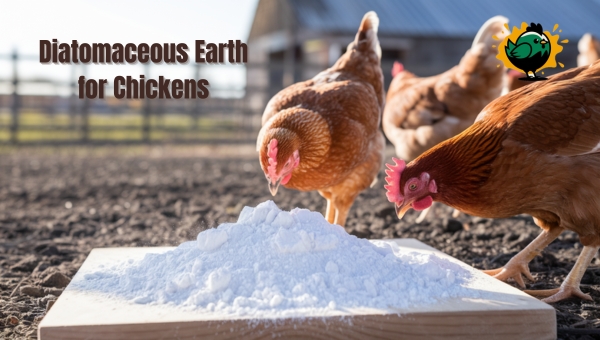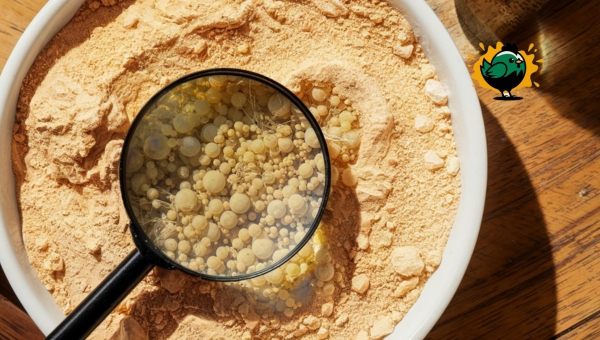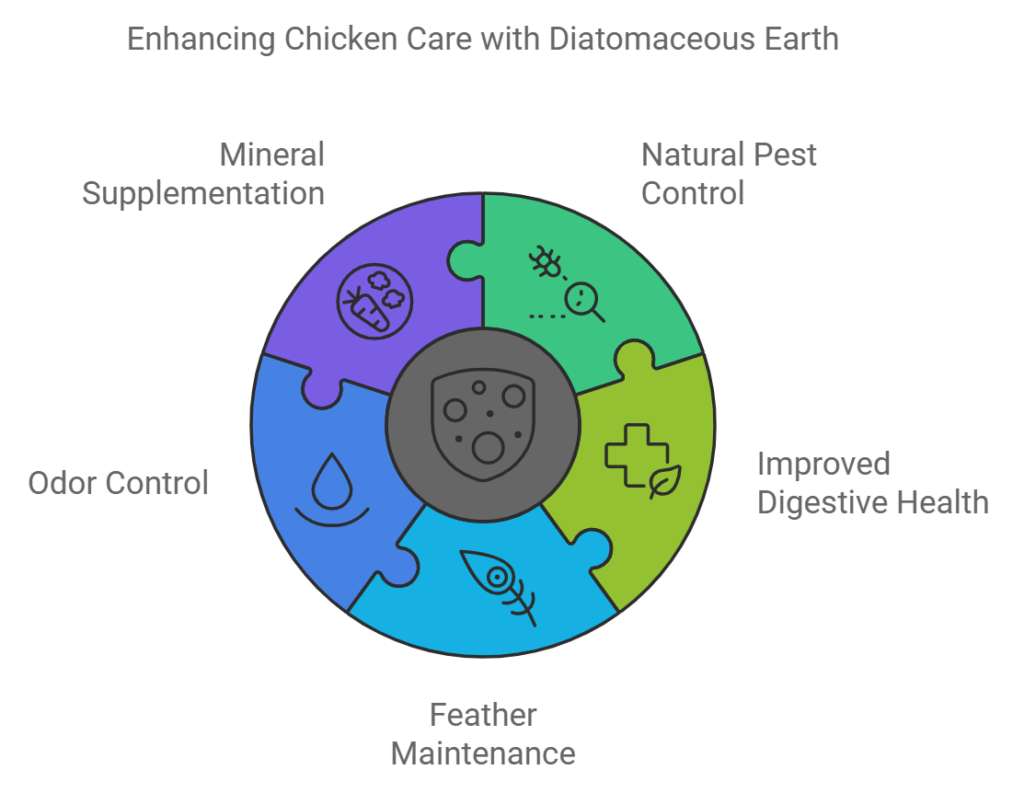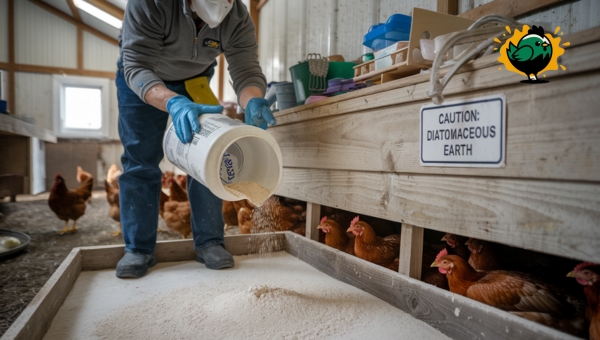Diatomaceous Earth for Chickens | Natural Protection

When it comes to keeping your flock healthy and happy, diatomaceous earth (DE) emerges as a natural powerhouse. With its unique ability to combat pests and enhance overall well-being, DE is gaining popularity among chicken keepers. Imagine a solution that’s not only effective but also environmentally friendly and chemical-free.
Whether you’re looking to boost your chickens’ digestive health or improve feather maintenance, diatomaceous earth offers versatile benefits that make it a must-have in your poultry care routine. Dive into the world of natural protection and discover how Diatomaceous earth for chickens can be the key to thriving chickens without compromising their health or safety.
Understanding Diatomaceous Earth
Diatomaceous earth is a natural substance formed from the fossilized remains of tiny aquatic creatures called diatoms. These creatures have silica-based shells, which make up about 80-90% of diatomaceous earth. This high silica content is what gives diatomaceous earth its unique properties.

The form used for chickens is specifically food-grade, ensuring safety for consumption. It is characterized by its abrasive texture, which helps in pest control by damaging the exoskeletons of insects.
Furthermore, its absorbent nature makes it effective for moisture and odor control in chicken coops. It is important to choose the right type of diatomaceous earth to ensure its benefits are maximized.
Benefits of Diatomaceous Earth for Chickens
Diatomaceous earth is widely used in chicken care for its various benefits. Here’s a detailed look at how it can support your flock:

- Natural Pest Control: Diatomaceous earth is an effective method for controlling pests like mites and lice. Its sharp particles physically damage the exoskeletons of these pests, causing dehydration and death. This makes it a natural alternative to chemical treatments.
- Improved Digestive Health: When added to chicken feed, diatomaceous earth can enhance digestive health. It acts as a natural dewormer, helping prevent the larvae of worms from maturing. Additionally, it supports nutrient absorption, potentially leading to better growth and egg production.
- Feather Maintenance: Diatomaceous earth can also aid in maintaining healthy feathers. Chickens naturally engage in dust bathing, and adding diatomaceous earth to their dust baths helps keep feathers clean and minimizes parasites.
- Odor Control: Diatomaceous earth absorbs moisture and odors, making it useful for maintaining a clean and fresh environment in chicken coops. This reduces unpleasant smells, ensuring a more comfortable setting for both chickens and their caretakers.
- Mineral Supplementation: As a source of essential minerals, diatomaceous earth can contribute to the overall health of chickens. It provides silica, which may play a role in strengthening bones and improving feather quality.
By incorporating diatomaceous earth into your chicken care routine, you can leverage these benefits to help maintain a healthy and pest-free flock.
Also Read: Sapphire Gem Chicken | The Surprising Ups and Downs!
How to Use Diatomaceous Earth with Chickens?
Incorporating diatomaceous earth into your chicken care routine can enhance their environment and overall health. Explore practical methods for applying diatomaceous earth in your chicken coop and bedding. Additionally, discover how to safely add it to your chicken feed to promote digestive health.
Application in Bedding and Coops
- Clean the Coop: Begin by removing all old bedding and thoroughly cleaning the coop to ensure a fresh start.
- Sprinkle Diatomaceous Earth: Evenly distribute a layer of diatomaceous earth on the floor, nesting boxes, and roosts to help control pests.
- Regular Reapplication: Apply diatomaceous earth regularly, especially after cleaning, to maintain effectiveness against pests.
Adding to Feed
- Measure Carefully: Use approximately 2% of diatomaceous earth in the total volume of chicken feed to ensure safe consumption.
- Mix Thoroughly: Combine the diatomaceous earth well with the feed to ensure an even distribution.
- Monitor Health: Observe your chickens’ health and behavior after introducing diatomaceous earth to their diet, making adjustments as necessary.
Safety Precautions
When using diatomaceous earth for chickens, it’s important to ensure that safety measures are in place to protect both the chickens and the handlers.

Understanding the correct dosage and being aware of potential risks can prevent any adverse effects. Let’s dive into the recommended dosage levels and the possible side effects associated with its use.
Dosage Recommendations
- Maximum Limit: Keep the diatomaceous earth to a maximum of 2% of the total feed volume to avoid digestive issues.
- Careful Measurement: Ensure precise measurement to maintain the optimal balance in their diet.
- Initial Monitoring: When first introducing diatomaceous earth, observe the chickens closely for any changes in behavior or health, adjusting the amount as needed.
Potential Risks
- Respiratory Concerns: Inhalation of the fine dust can cause respiratory problems in chickens and humans, so wearing masks during application is advisable.
- Overuse Effects: Excessive use may lead to dehydration or disrupt beneficial gut bacteria, which could affect overall health.
- Handling Precautions: Use gloves and protective gear to prevent skin irritation while handling diatomaceous earth.
Also Read: Treats for Chickens – Cool and Nutritious Frozen Snacks
Alternative Options to Consider
When exploring different ways to promote the health and safety of your chickens, it’s helpful to look into various methods.
While diatomaceous earth for chickens offers benefits, there are other options worth considering. These alternatives can complement or replace diatomaceous earth depending on your needs.
Herbal Treatments
Herbal remedies have been used for ages to improve chicken health. They can be used instead of or alongside diatomaceous earth:
- Garlic Powder: Known for its ability to help with parasites.
- Oregano Oil: This can support the immune system and has natural antimicrobial properties.
- Thyme and Rosemary: These herbs can help with respiratory health and provide natural pest deterrence.
Conventional Methods
Traditional approaches can also be effective for managing pests and maintaining chicken health:
- Chemical Treatments: These are often effective but come with potential health and environmental risks.
- Regular Health Checks: Routine visits to a vet can help catch and manage any health issues early.
- Proper Coop Maintenance: Keeping the coop clean can reduce the chance of infestations and diseases.
FAQs
How does diatomaceous earth help chickens?
Diatomaceous earth helps chickens by controlling pests like mites and lice, improving digestive health, and maintaining feather quality. It acts as a natural dewormer and can enhance nutrient absorption.
Is diatomaceous earth safe for chickens to eat?
Yes, diatomaceous earth is safe for chickens to eat when used in food-grade form. It should be mixed into their feed at a recommended dosage to ensure safety and effectiveness.
Can I use diatomaceous earth in my chicken coop?
Yes, diatomaceous earth can be used in chicken coops. It helps control pests and absorbs moisture and odors. Sprinkle it in bedding, nesting boxes, and on floors to maintain a clean environment.
Are there any risks associated with using diatomaceous earth for chickens?
While generally safe, there are potential risks. Inhalation of the fine dust can cause respiratory issues, and excessive use may disrupt gut flora. It’s essential to follow recommended usage guidelines.
Conclusion
Diatomaceous earth for chickens offers numerous benefits, including pest control, improved feather maintenance, and enhanced digestive health. By incorporating diatomaceous earth into your chicken care routine, you can promote a healthier and more comfortable living environment for your chickens.
However, it is crucial to adhere to safety guidelines and consider alternative options when necessary. Whether used in bedding, feed or as a supplement, diatomaceous earth can be a valuable addition to your poultry management strategy.
If you found this information helpful, explore more of our blogs for insights and tips on effective chicken care. Your flock deserves the best!
